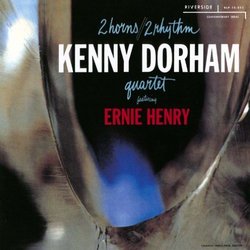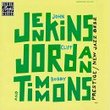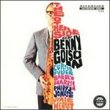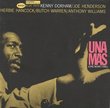| All Artists: Kenny Dorham Title: 2 Horns 2 Rhythm Members Wishing: 2 Total Copies: 0 Release Date: 5/27/2008 Album Type: Import Genre: Jazz Style: Bebop Number of Discs: 1 SwapaCD Credits: 1 |
Search - Kenny Dorham :: 2 Horns 2 Rhythm
 | Kenny Dorham 2 Horns 2 Rhythm Genre: Jazz
|
Larger Image |
CD DetailsSimilar CDs
|
CD ReviewsForget the math--another scintillating session by the one ho Samuel Chell | Kenosha,, WI United States | 05/21/2007 (4 out of 5 stars) "This is another scintillating session by perhaps the music's most underrated trumpet player (though I would have to add Bill Hardman and Jack Sheldon, both of whom are even more under-represented on recordings than Kenny). Completists will definitely want to pick this one up, though those new to Dorham may wish to start with "Una Mas" or "Whistle Stop" or even the recently remastered "Quiet Kenny" and "Trompeta Toccata."
Perhaps because of the absence of a piano on this date, Kenny feels the need to fill in extra space, thereby unleashing his abundant technical facility, which so often remains deceptively hidden. His lines are lithe, melodically and harmonically complex, making for a fresh-sounding version of one of his most recorded tunes, "Lotus Blossom." "Sposin'," taken at a much brighter tempo than is the norm, is another highlight. And as usual his programming contains rare surprises like "Is It True What They Say About Dixie?" And for characteristically quintessential Kenny check out "Noose Bloos," on which his use of space, squeezing of individual notes, and melodic choices are filled with humor, originality and tradition all at once. Ernie Henry, unlike the more familiar complementary horn of a Hank Mobley or Joe Henderson, is clearly a step or two behind Kenny, but he plays more alto than I gave him credit for based on his few brief appearances on Monk recordings. I remember him as a promising young player of questionable intonation along with a drug habit that would prove fatal. But I've never really been aware of the "intonation problem," perhaps because the influence of players like Ornette has led to our hearing pitches differently from the critics of Henry's day. The absence of piano certainly makes his playing especially reminiscent of Ornette's, though there's more than a trace of the uncompromising sound of early Jackie McLean as well. Piano or no piano, Dorham still sounds like Dorham, not Don Cherry--though this time out he's carrying more than the usual load, which is not a bad thing if you're as drawn to his playing as many of us are." |

 Track Listings (9) - Disc #1
Track Listings (9) - Disc #1

